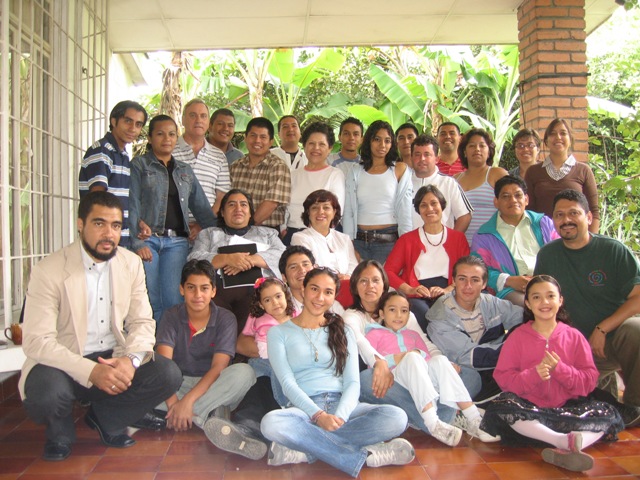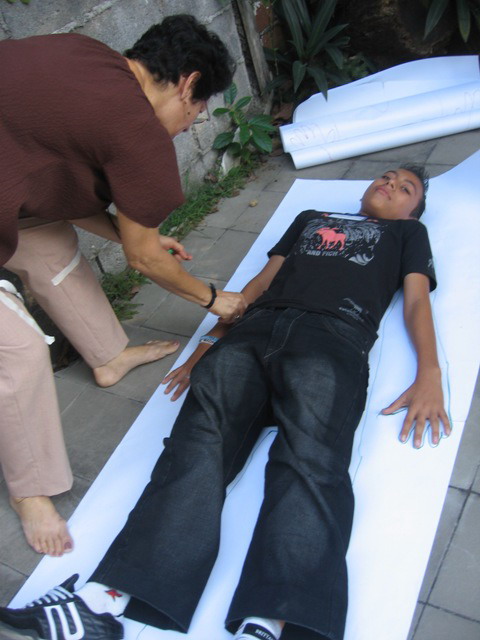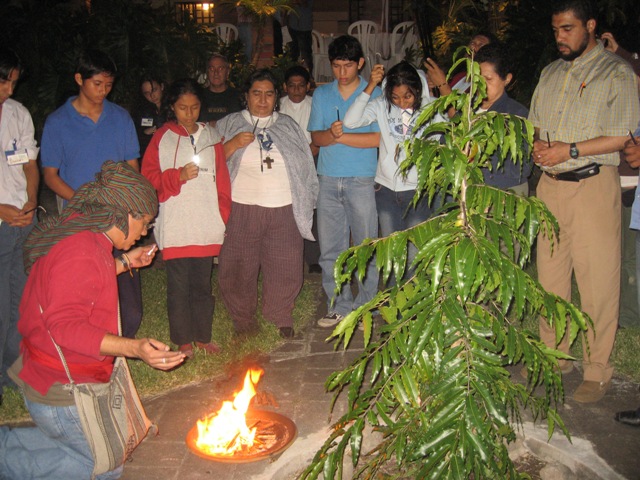18 adults from El Salvador, Guatemala y Honduras gathered in San Salvador to be introduced to the Toolkit for Ethics Education through Interfaith Learning. They discussed ways to work interreligiously to nurture values in children and youthvis à visthe challenges and rampant violence young people face in Central America.

A workshop to train facilitators on how to use the Toolkit for Ethics Education through Interfaith Learning was held in El Salvador from 1 to 5 November 2007. 18 participants from El Salvador, Guatemala and Honduras representing Bahá´í, Buddhism, Christianity, Indigenous beliefs, Islam and Judaism gathered to learn and share ways to work together to nurture ethical values in children and youth in Central America. The workshop was organized in cooperation with Religions for Peace in El Salvador.
The first day participants reflected on their identities, similarities and differences. They discussed the importance of allowing children to reflect on who they are and what is important for them. The richness of diversity and of discovering the commonality of their experiences was highlighted as one of the key elements of ethics education.
Mrs. Maria Lucia Uribe, from the Arigatou Foundation in Geneva introduced the Toolkit to the participants. She explained how the Toolkit has been developed, its purpose and its components. Mrs. Uribe acknowledged its flexibility to incorporate regional resources that can help nurturing values in children and to be adapted to the country social reality.
 Mrs. Mercedes Roman, GNRC Coordinator for Latin America and the Caribbean, led a session on the Convention on the Rights of the Child. She asked participants to discuss the Convention as an instrument that can support the full development of the child. She emphasized that the Toolkit provides a framework to foster children’s participation and to nurture respect for people of other religions, cultures and beliefs, which are central components of the Convention. Mr. Larry Madrigal, from the Center San Bartolome de las Casas, and member of the facilitators’ team, discussed with the participants adult- centrism approaches and how those affect children’s and youth’s participation in society. This was part of the follow-up of previous workshops and activities carried out in the GNRC in El Salvador.
Mrs. Mercedes Roman, GNRC Coordinator for Latin America and the Caribbean, led a session on the Convention on the Rights of the Child. She asked participants to discuss the Convention as an instrument that can support the full development of the child. She emphasized that the Toolkit provides a framework to foster children’s participation and to nurture respect for people of other religions, cultures and beliefs, which are central components of the Convention. Mr. Larry Madrigal, from the Center San Bartolome de las Casas, and member of the facilitators’ team, discussed with the participants adult- centrism approaches and how those affect children’s and youth’s participation in society. This was part of the follow-up of previous workshops and activities carried out in the GNRC in El Salvador.
During the next two and a half days 25 children from the religious organizations that were present, came together with the adults to nurture their spirituality by learning to better understand each other, to discover peaceful ways to transform violent situations and to develop their capacity to work together to bring peace in their society, despite their differences.
 Mrs. Amada Benavides, from Escuelas de Paz Foundation in Colombia and also a member of the facilitators’ team, led an activity about identity. Participants reflected on who they are and shared their reflections with one another. This led them to find out through dynamic exercises their differences and similarities and discuss the importance of diversity in the world and in their society. They explored ways of working together for common goals and reflected on the uniqueness of each individual. Participants concluded that is possible to work together when they learn to respect each other and when they appreciate otherness with an open mind and heart.
Mrs. Amada Benavides, from Escuelas de Paz Foundation in Colombia and also a member of the facilitators’ team, led an activity about identity. Participants reflected on who they are and shared their reflections with one another. This led them to find out through dynamic exercises their differences and similarities and discuss the importance of diversity in the world and in their society. They explored ways of working together for common goals and reflected on the uniqueness of each individual. Participants concluded that is possible to work together when they learn to respect each other and when they appreciate otherness with an open mind and heart.
Several sessions were conducted to discuss violent conflicts, non-violent alternatives, to encourage creative thinking to solve differences with others and to learn ways to leave behind prejudices and stereotypes. Participants mapped out conflicts that affect them and identified possible ways to peacefully transform those. Especially in El Salvador, where violence among youth take place in daily basis and through organized crime and settings, the need to nurture ethical values in children and to work with families emerged as a crucial element for implementing the ethics education initiative.
A visit to a Synagogue was organized for the participants to put themselves in others’ shoes. The Rabbi Pablo Berman explained the customs and beliefs of Judaism and presided a ceremony to close the Shabbat. This activity helped participants to open their eyes to a religion they were not familiar with and to also reflect upon their own beliefs. A proposal to continue visiting other religious places was made as a commitment to continue this inter-religious journey and to continue exploring ways to work together in issues that affect children and youth.
Prayers from different religions, music, moments of silence and activities to foster introspection helped creating a conducive environment to nurture participant’s spirituality and to discover the need to find peace within to be able to bring peace to their societies.

The workshop was closed with a prayer led by the indigenous representatives. This moment of spirituality were all participants got together to reflect on the learnings of the workshop and to internalize the experience they lived led to experiencing a common humanity and the need to continue working together as people of faith.
Special thanks to Rev. Santiago Flores, GNRC Coordinator for El Salvador for his leadership bringing together people from different religions and preparing the path to introduce the Toolkit for Ethics Education in El Salvador. Thanks also to Religions for Peace in El Salvador for their outstanding support and willingness to cooperate with the GNRC in its endeavour to work for the well being of children.